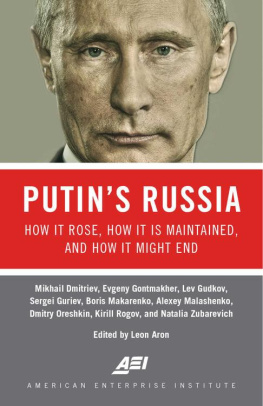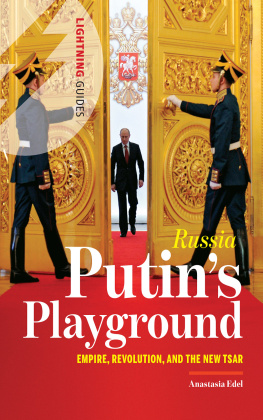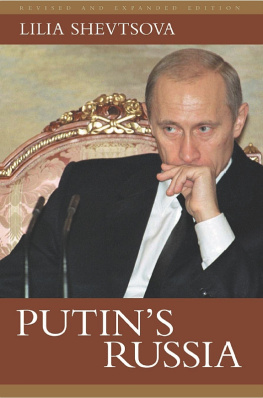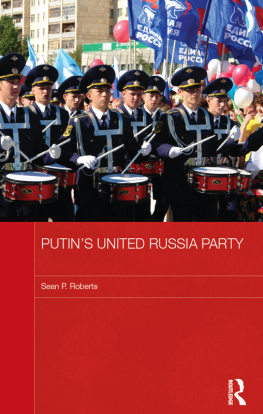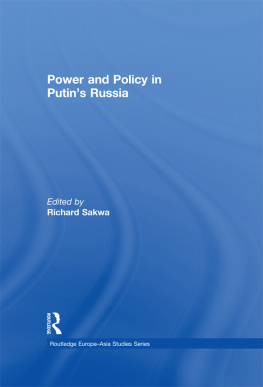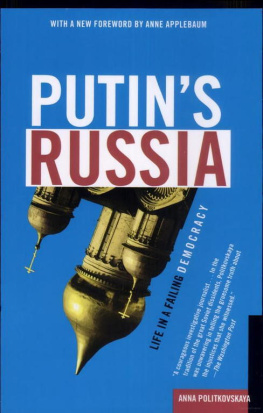2015 by the American Enterprise Institute. All rights reserved. No part of this publication may be used or reproduced in any manner whatsoever without permission in writing from the American Enterprise Institute except in the case of brief quotations embodied in news articles, critical articles, or reviews. The views expressed in the publications of the American Enterprise Institute are those of the authors and do not necessarily reflect the views of the staff, advisory panels, officers, or trustees of AEI.
American Enterprise Institute
1150 17th St. NW
Washington, DC 20036
www.aei.org
Contents
PART I
P OLITICAL E CONOMY , P OLITICAL G EOGRAPHY, AND THE P OLITICS OF F EDERALISM
Sergei Guriev
Natalia Zubarevich
Evgeny Gontmakher
PART II
R EGIME , I DEOLOGY , P UBLIC O PINION, AND L EGITIMACY
Lev Gudkov
Mikhail Dmitriev
Kirill Rogov
PART III
C IVIL S OCIETY: D EFEAT AND R ADICALIZATION?
Boris Makarenko
Dmitry Oreshkin
Alexey Malashenko
Introduction
With an intellectual feast awaiting, I promise not to detain the readers of this compilation a minute longer than necessary and will use the introduction merely to whet their appetite.
At the outset of this project, my hope was to assemble a dream team of Russias topand most of my favoritepolitical sociologists, political geographers, and political economists; ask them to write about what they think are the most significant trends in their field of study; and have them project three to four years ahead. To my surprise and delight, every one of the nine authors I sought out agreed. The result is a collection of essays unmatched, I believe, in Russian studies today in depth and breadth.
Caveat emptor: a reader looking for an elaboration of todays headlines might be disappointed. While the annexation of Crimea and the war in Ukraine are definitely part of the conceptual framework for most of these essays, these events (as well as plunging oil prices and the economic sanctions against Russia) are not what this book is about. Instead, it is designed to describe and analyze some of the regimes key structural strengths and weaknesses that are obscured by what Russian journalists call the smoke of the battle for Ukraine. As far as the regimes fault lines are concerned, the evidence presented by the authors shows no reversal, or even narrowing, of these structural dysfunctions in Putins third presidential term.
Indeed, most of the problemsor perhaps more precisely, potential political, social, and economic criseshave been exacerbated since March 2014. To quote Boris Makarenko, The rallying around the flag buys time for the regime but does not resolve a single socioeconomic problem. It is these postponed crisestheir causes and their impact, on the one hand, and the regimes engagement with them, on the otherthat this book is about.
To elucidate the antecedents and political implications of the unfolding economic crisis, Sergei Guriev opens by retracing Russias macroeconomic dynamics of the past 14 years. Guriev dates the start of the current economic crisis to early 2014, before international sanctions were imposed against Moscow and before oil prices fell. Instead, he lays blame mostly at the regimes door for rejecting the institutional reforms needed to radically modernize the countrys economy and end its reliance on hydrocarbons.
The shrinking of the national economic pie is bound to aggravate the structural dysfunctions in the relationship between the Russian center and provinces, described by Evgeny Gontmakher, and extend the rifts between what Natalia Zubarevich calls the four Russias: segments of society sharply varied in their income, urbanization, education, upward mobility, and, as a result, modalities of their political attitudes and loyalty to Putins regime.
Like the United States, Brazil, or Germany, Russia is too big and too diverse to be both unitary and democratic. Instead, again and again throughout the countrys history, liberalizations have almost invariably been accompanied by greater self-rule at the local level, while authoritarian consolidations have inevitably led to a more rigid subjugation of the country to the center. Small wonder, then, thatas Gontmakher demonstratesPutin has chosen and systematically pursued the latter path.
Already in Putins first presidential term (200004), the march toward the vertical of power (as Putin called the central governments complete control over regions) included abolishing the direct election of regional governors, denying both an independent political base and loyalty to local leaders. Another blow to regional autonomy was the change in the composition of the Federation Council (the upper chamber of the Federal Assembly, or Russian parliament), where governors used to be ex officio members (senators) and thus had a say in national politics.
Yet, while the vertical of power has made a sham of constitutionally mandated federalism, Gontmakher points out the unintended consequences eroding the centers rigid control of the unitary state. The quality of the centers decision making is being compromised by distorted feedback from the regions and increasingly selective implementation of the centers decisions as local authorities increasingly deviate from its control. In the end, the relations between the center and provinces amount to what Gontmakher calls a systemic crisis in Moscows ability to govern Russia.
Examining some of the similar problems from the opposite end of the vertical of power, Zubarevich further develops her four Russias theory, increasingly recognized as one of the most useful tools for assessing and predicting the countrys political dynamic. Based on the economic geography and demography, she maps out in fascinating detail population clusters ranging from those engaged in postmodern economic activity to Russian citizens with the lowest levels of education and upward mobility, higlighting the pronounced differences in these groups quality and way of life and values.
***
Trends in ideology, public opinion, and legitimacy are taken up by Lev Gudkov, Mikhail Dmitriev, and Kirill Rogov, who agree that it was the constant and significant economic growth in household income between 2000 and 2008 that secured Putins high approval ratings and, with them, the regimes legitimacy and what Dmitriev calls a political equilibrium, responsible for the relative stability of the regime during that period.
Delving into the causes of Putins personal popularity within the current political system of plebiscitary presidentialism (in essence, authoritarianism with elections that do not change the head of state), Rogov does not attribute the Russian presidents appeal to some extraordinary charismatic qualities. Rather, he attributes it to a systemic phenomenon deeply connected to both the needs of society, on the one hand, and the institutional environment, on the otherthat is, the regimes almost total control or manipulation of key political, legal, and social institutions.
Rogov diagnoses the key to the regimes stability as Putins supermajority (overwhelming political support), which is held together by a combination of economic and mobilization factors. The former category is predicated on economic growth, while the latter derives largely from the effects of a value-centered rallying around the leader, who is perceived as both an effective wealth manager and the savior and protector of the nation. Some examples of the mobilizing trends are the 2000 war in Chechnya, the 200304 war on the oligarchs, and the 2008 war on Georgia. (The 2014 annexation of Crimea and the war on Ukraine also fit well into this paradigm, as evinced by the 2025-point upswing in Putins ratings.)

